- Home
- Jeremy Robinson
Jack Sigler Continuum 1: Guardian
Jack Sigler Continuum 1: Guardian Read online
GUARDIAN
A Jack Sigler Continuum Novella
By Jeremy Robinson and J. Kent Holloway
Summary:
Jack Sigler, Callsign: King, has been a lot of things in his life. A soldier, a father, a hero. But now he’s taking up a new title: guardian.
After a life fighting billionaire madmen, terrorists and unnatural threats, he’s stuck thousands of years in the past, using his knowledge of history and modern warfare to right wrongs and stand up for those in need.
When he meets a twelve year old boy—the prince of the Babylonian Empire—who is to be sacrificed to the ancient goddess, Tiamat, by a twisted High Priest, King steps in, sword swinging. But what starts as a simple snatch and grab, quickly turns into a pitched battle against a legion of men and hideous creatures. As Tiamat rises from her ancient resting place, the fate of the world—and King’s future—is at stake.
Trapped millennia in the past and gifted with regenerative abilities, King must live out the centuries until he returns to his own time and his family. The Jack Sigler Continuum series tells the events that occurred in King’s life as a result of the full-length novel, Omega, but no prior reading is required to enjoy the Continuum series. Each story will be a standalone adventure, and a great jumping-on point. For more of King’s adventures, check out the entire Jack Sigler/Chess Team series.
Praise for Robinson
“Rocket-boosted action, brilliant speculation, and the recreation of a horror out of the mythologic past, all seamlessly blend into a rollercoaster ride of suspense and adventure.”
—James Rollins, New York Times bestselling author of The Eye of God
“With Threshold Jeremy Robinson goes pedal to the metal into very dark territory. Fast-paced, action-packed and wonderfully creepy! Highly recommended!”
—Jonathan Maberry, New York Times bestselling author of Rot & Ruin
“Jeremy Robinson is the next James Rollins”
—Chris Kuzneski, New York Times bestselling author of The Einstein Pursuit
Praise for Holloway:
“Not since Preston & Child’s Agent Pendergast has there been a more mysterious, charming and fun to read sleuth as Ezekiel Crane. His mixture of southern charm, dark history and scientific know-how is intoxicating.”
—Jeremy Robinson, bestselling author of Island 731 and Omega
“Holloway skillfully weaves a back-woods tapestry of Sherlock Holmes with TV’s Supernatural and Justified into a thrilling Appalachian story of magic and mayhem. The Dirge amps up the action, menace, and mojo, for a spookfest of epic proportions, with a layered mystery and surprises at every turn. Join Ezekiel Crane, and bring your ten-demon bag for another Dark Hollows adventure. This series somehow got even better.”
—Kane Gilmour, bestselling author of Ragnarok and The Crypt of Dracula
“Siren’s Song hits all the right notes. A page-turning plot, heart-stopping battles above and below the waves, cutting-edge technology and weaponry—and of course, more double-crossing villains than you can shake a spear-gun at. Holloway’s a skilled conductor, and Siren’s Song a thrilling symphony.”
—David Sakmyster, author of The Pharos Objective
GUARDIAN
A Jack Sigler Continuum Novella
By Jeremy Robinson
and J. Kent Holloway
Older E-reader device? Click here for e-book store.
To all those who protect and serve.
To those who fight the good fight for the safety and security of us all.
To all those who risk everything as ‘guardians’
in a dangerous world.
Contents
Prologue
Chapter 1
Chapter 2
Chapter 3
Chapter 4
Chapter 5
Chapter 6
Chapter 7
Chapter 8
Chapter 9
Chapter 10
Chapter 11
Chapter 12
Chapter 13
Chapter 14
Chapter 15
Chapter 16
Chapter 17
Chapter 18
Chapter 19
Chapter 20
Chapter 21
Chapter 22
Chapter 23
Chapter 24
Chapter 25
Chapter 26
Chapter 27
Chapter 28
A Note from Jeremy Robinson
About the Authors
Also by the Authors
JACK SIGLER: A MAN OUT OF TIME
Jack Sigler was a modern soldier. First for the Army, then for the anti-terror Delta unit known as ‘Chess Team’ and finally for Endgame, a black budget organization specializing in fending off strange and otherworldly global threats. After several brutal, yet successful missions, the man known by the callsign: King, found himself torn away from his family and thrust back in time, abandoned in the year 780 BC. But that’s not where his life would end. He was gifted with regenerative powers, making him nearly immortal. He heals quickly. Doesn’t age. And he’s nearly 2800 years away from his daughter and fiancée.
Now, the only way he can return to his own time and his family is to live, fight and sometimes wage war through the oncoming centuries, carrying on Endgame’s mission: to protect the weak, right wrongs and send the world’s monsters back to whatever hell spawned them.
Guardian, the first tale in the Jack Sigler Continuum series, takes place after King has lived in the past for over two hundred years…
PROLOGUE
Mount Mashu, Zagros Mountain Range, Persia, 576 BC
Few men in all the earth were courageous enough to raise the gods of chaos, but Sereb-Meloch counted himself among those brave souls. In fact, today, the unnaturally lanky high priest intended to go one step beyond. The lesser gods were of no concern to him. Nothing but the fiercest of goddesses would be enough to accomplish what he’d planned for so long. After all, only the mother of all gods could destroy the world.
Sereb-Meloch smiled, allowing the thought to finally filter through the near-impenetrable wall of caution he’d erected over the years. His smile broadened as he placed the ancient ceremonial headdress of his goddess on his head. He stepped from his tent and out into the crisp, frigid air hanging over the summit of fabled Mount Mashu, on the outer edge of the Fertile Crescent. He gazed out at the orange-red glow of the sun as it began to slide just under the horizon. The near-blinding snow blanketing the earth, and the grand cedar trees surrounding them, gradually transformed into unsettling shades of purple and blue.
Despite the setting sun, however, his band of nearly one-hundred and forty slaves still chipped away at the rocky slope of the mountainside, in rhythm to the beat of their driver’s drums. They’d been at it for nearly three weeks now and the treacherous climb to their current location, along with the hours of grueling labor to clear the rocky debris, had claimed one third of the crew.
The loss of his men mattered little. Sereb-Meloch would gladly have sacrificed ten thousand more to reach what was behind those gods-forsaken rocks, deposited by a rockslide a millennia before. The Gate of Shamash. The doorway, the legends said, used by Gilgamesh himself on his journey toward immortality. Trivialities such as eternal life mattered little to Sereb-Meloch. For him, they were the doors that would open the pathway to Her, and thus, to power beyond anyone’s ability to imagine.
For centuries, scholars and adventurers had erroneously believed the gate lay somewhere within the lush mountains of Lebanon. Years of careful study had proven those theories false. It was only through years of patient research and the will of his most faithfu
l goddess that the true location along the eastern border of Persia, on the edge of the Zagros mountain range, had been revealed to the priest.
“Ba’al Sereb-Meloch! Ba’al!” cried one of his priests, drawing him from his reverie. He looked over to the man called Jereziah, fur-covered robes wafting behind him as he raced up to the priest, wheezing for breath. “We have broken through!”
The high priest turned his lean frame toward the rocky debris and smiled. “Excellent. And Shamash’s Gate?”
Jereziah nodded. “Exposed. But it will take a while longer to be able to fully open them.”
“How much longer?”
“Another twelve hours, at least.”
Sereb-Meloch glanced at the sky. Dusk was quickly slipping into night. In twelve hours, the sun would be creeping once more over the horizon, and it would be too late. They would once more have to wait for the sun to set, before they could open the gate, and that was one more wasted day for which he had no patience.
“That is not good enough,” he said. “Work the slaves harder. The Gate must be open by midnight, if we are to retrieve our prizes before the rising sun.”
“But your grace...”
“See that it is done, Jereziah.”
The neophyte priest frowned, but nodded his understanding and scurried off, already shouting to rouse the workers. The sound of the whip intensified, and the drivers’ voices raged against their charges. He allowed himself a few minutes to watch the renewed vigor with which the arduous work was done, then he gestured to the mercenary captain, Zaidu, who was currently keeping watch at the doorway to a nondescript tent in the center of the camp. When the captain approached, Sereb-Meloch returned his salute, then spoke.
“How is our guest doing this evening?” he asked.
“Beastly, that one,” Zaidu growled as he tilted his head to indicate the tent. “I will be glad when he is dead. He bit my arm again this morning. Gave him a bloody nose in exchange for it. I doubt he will give us any more problems.”
Sereb-Meloch regarded the captain coolly. The prisoner was not to be harmed. At all. But the mercenary scum he’d hired apparently hadn’t taken him seriously. Nor did any of them remotely show the proper respect due to a man of his stature. Issues that would undoubtedly be rectified soon, but for now, he would maintain a modicum of civility toward the soldiers-for-hire in his employ. Soon enough, when the gates were finally open, he’d have no more use for any of them. What lay inside, coupled with his own band of warrior-priests, would be more than enough to liberate Her. The mercenaries, he decided, would be a welcome diversion for those that had slumbered for so long within the mountain. In the meantime, he’d tolerate the mongrel’s barbarous behavior.
“Fine, fine,” he said, grinding his teeth with each word. “But it is almost time. Assist the priests as they prepare him for the Gate’s opening. Bring him to the stone and secure him to it. When the Gate is finally opened, he will be the first thing they will see.”
“And who is it that lives beyond those gates? You have yet to tell us what it is we are after. All we have had to go on is rumor and the tales of old wives.”
Sereb-Meloch willed his eyes not to involuntarily roll in annoyance at the impertinent question. These mercenaries had no concept of their proper place. The sooner these simpletons were dead, the better.
“Namtar and Tiamba,” the high priest offered.
The mercenary stared blankly. “Who?”
“It matters not. You will see for yourself, soon enough.” Sereb-Meloch paused, allowing his wolfish grin to soften a bit. “And you will witness their terrible might firsthand...as they lay claim to our sacrifice.”
Zaidu scowled, obviously uneasy with that last part. An irony, really, considering the fact that he would undoubtedly kill his own mother, were the pay good enough. Strangely, the sacrifice of their prisoner, who had been nothing but a nuisance since they’d captured him, caused a moral dilemma for the black-hearted soldier.
Interesting, Sereb-Meloch thought.
“Do we have an understanding here?” he asked, forcing the captain to look him in the eye.
The mercenary nodded. “I will get the foreigner, Achelous, to help us. He has been effective with the prisoner. Has a way of calming him down.”
“Fine. Fine,” Sereb-Meloch repeated, waving the man off with disinterest. He didn’t care how it was done. His only concern was that the prisoner be bound to the sacrificial stone before the gate was opened. Before Zaidu reached the prisoner’s tent, Sereb-Meloch turned away, focusing once more on his laborers, as they pressed forward into the widening gap. At their current pace, they might finish on time. In the meantime, all he could do was wait and watch the work unfold.
Hours later, Sereb-Meloch clapped twice, signaling his men to bring out the prisoner. The handful of mercenaries scrambled to comply, rushing around to the opening of the tent and pulling back the door flaps. The tall, fairer skinned warrior—Zaidu had called him Achelous—stepped inside and disappeared from view. A minute later, he reemerged with a young, struggling boy in tow.
The boy—called Belshazzar—was the future heir to the Babylonian empire. He let out a string of curses on the men, as he was lifted off the ground by three of them and carried toward the stone slab. Sereb-Meloch watched in amusement as the whelp—he was no more than twelve years old—kicked one of the guards in the side of the head, eliciting a howl of pain and no small amount of blood.
The boy has great power, the high priest thought, reflecting on the man’s head wound. Good. It will make the sacrifice all the sweeter.
The battle-hardened warriors struggled to carry the squirming prince down the mud-covered slope to the altar, then roughly dropped him on the slab before securing him with leather straps, at his wrists and ankles. The prince screamed, promising vengeance on all who had abused him, as he tugged futilely at his bonds.
“Your highness,” Sereb-Meloch said as he strode to the altar. “Please do not struggle. You might injure yourself.”
Belshazzar growled at the high priest. His eyes narrowed with murderous hatred toward his captor. “Ba’al Marduk will cut the soul from your body and feast upon it for what you are doing to me, heretic! I will dance on your grave in honor of my grandfather.”
Sereb-Meloch chuckled. He had not been called a heretic for nearly two decades, and to hear it now, uttered from the lips of this arrogant child, brought more joy to him than he would have imagined. Not for the words themselves—they were a source of shame for him, after all—but because the beliefs he’d heralded for so long, the same beliefs that had labeled him as such, were about to be proven true. He was about to succeed in the lifelong quest that had seen him banished by the prince’s grandfather, Nebuchadnezzar, so many years ago.
“I doubt you will ever have the ch—” He was interrupted the shouts of a cadre of his priests running up to him.
“Ba’al, we have done it,” said one of the priests. Sereb-Meloch could never recall the man’s name for some reason. “We have cleared the entrance!”
The high priest turned to Jereziah, who’d been lagging behind due to his rotund girth. “Is this true?”
The fat priest nodded, excitement evident across his features.
“And the key? Did you find a place for the key?”
Another nod. “The Gate awaits you, Ba’al. With a turn of the key, your new warriors will be set free.”
Sereb-Meloch looked down at the Babylonian prince, still struggling to free himself from the leather bonds. “No,” he said. “Not yet. First, we must feed them.”
1
The locking mechanism to Shamash’s Gate squealed in protest as the ancient bronze artifact turned against the gears. The key—an artifact of unknown origin—had taken Sereb-Meloch eight years to locate and another three to retrieve. It had required a fierce battle with a particularly brutal tribe in the northern-most part of the world, one filled with men of unusual yellow-orange hair and thick, braided beards. As with his current expedit
ion, he’d lost hundreds of men, but he’d succeeded in the end. The ignorant chieftain from the north had had no idea of the value of the strange, cylindrical object that had been passed down in his family for nearly ten generations. It was his ransom for surrender to Sereb-Meloch’s more ingenious and determined forces.
A rush of air hissed from the seam of the sealed gate, after centuries of being closed to the outside world. The high priest stepped back to admire the monstrous barricade that separated him from the second part of his plan. The door itself was a marvel of ancient ingenuity. A construction that could have come only from the gods themselves. Standing nearly forty feet in the air and made of a polished metal unknown to metal smiths, it was etched with rows of strange writings arranged in a semi-circle just below the door’s lintel. The words, lost forever through ages of disuse, were probably warnings of some kind, he surmised. Vague and threatening exhortations used to scare away the superstitious.
The builder would, however, find Sereb-Meloch not easily cowed.
“Open it.” He glanced over at Zaidu and nodded toward the gate.
The mercenary captain’s eyes widened. “What? Me?”
The high priest cast a reproving look before nodding. “You will not be able to open it by yourself, of course.” He gestured around to the mercenary force milling nervously around. “Choose three of your strongest men to assist you.”
“But...but...”
“Captain Zaidu, is there a problem?”
The mercenary swallowed as he turned his gaze up at the enormous metal abomination before him.
“Is this not something the slaves should do?” he asked.

 Alter
Alter From Above - A Novella
From Above - A Novella Flux
Flux Tether
Tether Exo-Hunter
Exo-Hunter Pulse
Pulse Cannibal
Cannibal Omega: A Jack Sigler Thriller cta-5
Omega: A Jack Sigler Thriller cta-5 Flood Rising (A Jenna Flood Thriller)
Flood Rising (A Jenna Flood Thriller) Viking Tomorrow
Viking Tomorrow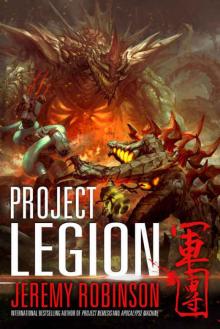 Project Legion (Nemesis Saga Book 5)
Project Legion (Nemesis Saga Book 5) BENEATH - A Novel
BENEATH - A Novel Kronos
Kronos SecondWorld
SecondWorld XOM-B
XOM-B Forbidden Island
Forbidden Island Project Maigo
Project Maigo The Last Hunter - Descent (Book 1 of the Antarktos Saga)
The Last Hunter - Descent (Book 1 of the Antarktos Saga) Jack Sigler Continuum 1: Guardian
Jack Sigler Continuum 1: Guardian Infinite
Infinite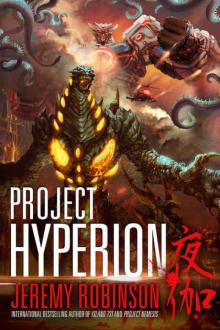 Project Hyperion
Project Hyperion The Distance
The Distance The Divide
The Divide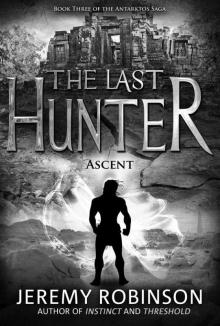 The Last Hunter - Ascent (Book 3 of the Antarktos Saga)
The Last Hunter - Ascent (Book 3 of the Antarktos Saga) The Last Hunter - Pursuit (Book 2 of the Antarktos Saga)
The Last Hunter - Pursuit (Book 2 of the Antarktos Saga) Raising the Past
Raising the Past The Others
The Others The Last Hunter - Collected Edition
The Last Hunter - Collected Edition Threshold
Threshold Blackout ck-3
Blackout ck-3 Antarktos Rising
Antarktos Rising Viking Tomorrow (The Berserker Saga Book 1)
Viking Tomorrow (The Berserker Saga Book 1) The Didymus Contingency
The Didymus Contingency Savage (Jack Sigler / Chess Team)
Savage (Jack Sigler / Chess Team) Prime
Prime Insomnia and Seven More Short Stories
Insomnia and Seven More Short Stories Empire (A Jack Sigler Thriller Book 8)
Empire (A Jack Sigler Thriller Book 8) Unity
Unity Instinct
Instinct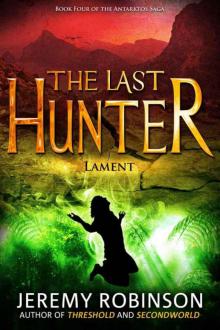 The Last Hunter - Lament (Book 4 of the Antarktos Saga)
The Last Hunter - Lament (Book 4 of the Antarktos Saga) MirrorWorld
MirrorWorld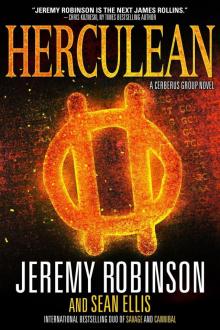 Herculean (Cerberus Group Book 1)
Herculean (Cerberus Group Book 1) Island 731
Island 731 Omega: A Jack Sigler Thriller
Omega: A Jack Sigler Thriller Patriot (A Jack Sigler Continuum Novella)
Patriot (A Jack Sigler Continuum Novella) 5 Onslaught
5 Onslaught SNAFU: Survival of the Fittest
SNAFU: Survival of the Fittest Helios (Cerberus Group Book 2)
Helios (Cerberus Group Book 2)